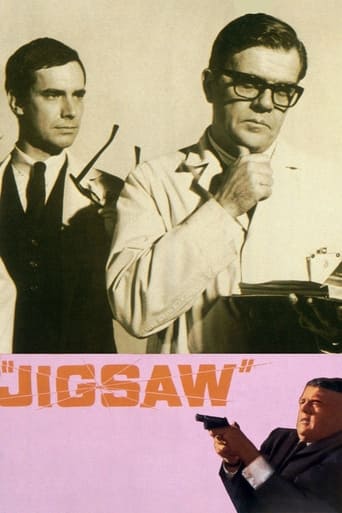



Very disappointed :(
Plot so thin, it passes unnoticed.
Amateur movie with Big budget
All of these films share one commonality, that being a kind of emotional center that humanizes a cast of monsters.
View MoreI originally saw this film when it was first shown on commercial TV in the seventies and again in the mid eighties, but not in the theater. It seemed to be cut very badly to fit commercials...I found it very enjoyable with excellent acting and an interesting plot. It has never been available on video or DVD maybe due to licensing or a perception of low consumer interest by Universal. (If anyone has a copy in either format, let me know.) I don't think it's been shown on TV in at least 20 years. Most people I've talked to have never heard of it despite what I consider an all star cast including Hope Lange, Bradford Dillman, Pat Hingle, and Harry Guardino. I look forward to seeing it uncut someday.
View MoreDefinitely screams '60's Universal Studio Telefilm', but if you liked the looks of those pictures (as I do), this is a well photographed, directed and acted little picture. Bradford Dillman, that Olivier of the B's, starred, but Pat Hingle and Harry Guardino had the tastier roles. James Goldstone directed -- he had one of the cleanest, most recognizable styles of late sixties contract directors, though his name is barely known.The story is a very loose remake of Mirage, the 1960 Gregory Peck vehicle, but it is really another picture entirely. If you've seen the one, you have not seen the other.Jigsaw swims simultaneously in alienation, paranoia, 60's technicolor psychedelia, and general cold war fear and loathing. The surprise ending is a visual gas, the cinematic equivalent of an acid flashback. It deserves a look if it ever shows up on the tube. In these more modern times of alienation, paranoia, and fear and loathing, an entertaining, slightly fluffy reminder that we've already met the enemy and he is STILL us.
View MoreI doubt Jigsaw was hip even at the time, the whole LSD theme married to a murder mystery being a patently obvious attempt to grab a young audience of the era without in the least truly showing any understanding of the sixties counterculture. The dated aspect aside, Jigsaw suffers from many problems, including overwrought acting, silly and stilted dialogue, LSD flashbacks that go on interminably long even after the point has been hammered home in the first 60 seconds, a failure to create any true suspense even though the actual plot is, on paper, a great vehicle to do just that, and an ending that is so trite and predictable (not to mention reminiscent of a lot of bad television shows) that the climax is actually an anti-climax. If it was a better movie, we might be able to suspend disbelief on a few things where it would help enjoyment, but the weaknesses are so glaring they only serve to highlight the improbabilities viewers might otherwise overlook. I saw Jigsaw on television and it is definitely late night TV fare meant to fill airspace and pass the time to kill somebody's insomnia rather than anything anybody ought to actively seek out. At very best, a three out of 10.
View MoreA remake of 1965's "Mirage" updated for the late 60s by making LSD more important to the plot than amnesia (Gregory Peck's "problem" in the earlier film). "Jigsaw" was actually produced by Universal as a TV movie, but like their earlier remake of "The Killers," it was released theatrically instead (but only briefly--in Cleveland, Ohio, it was brought in as a supporting feature for United Artists's "Hang 'Em High" at the Hippodrome theater when the latter film was in its final weeks). Like "The Killers," it turned up on NBC shortly thereafter. If it isn't as good as "Mirage," it isn't bad at all, although like a lot of Universal product at the time, its attempts to recreate contemporary youth culture looks very dated (I refer you to the discoteque sequence in the same year's "Coogan's Bluff"). Bradford Dillman is good in the role originally played by Peck, and Harry Guardino is better in Walter Matthau's private eye role. Michael J. Pollard, still very prominent in the public eye at the time thanks to the endless re-issues of "Bonnie and Clyde," also turns up, and his presence was a key selling point in the advertising campaign.
View More